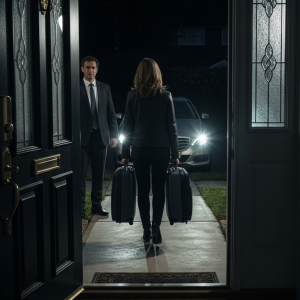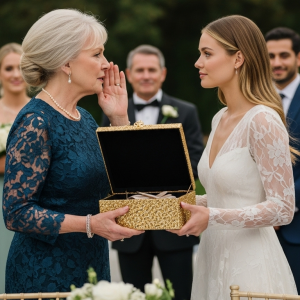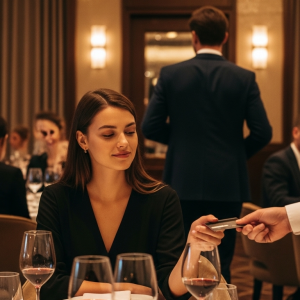My name is Adrien. I’m 34 years old, and for most of my life, I have been the fixer. I have a younger brother, Tyler. He’s 31, charming, successful, and very, very good at playing the golden child. I’ve always been the quieter one, the planner, the one who helped pay for things when our parents couldn’t. And still, somehow, I’ve always been just background noise to everyone else’s highlight reel.
Growing up, Tyler was the kind of kid who would break a lamp and instinctively blame it on me. I was the one who would take the fall to keep the peace. Our parents would sigh and say, “He’s still learning, Adrien. You’re older. Be the example.” And I was. When he stole my car at 17 and dented the side, I paid the insurance deductible myself. When he called me from a holding cell at 21 for trying to shoplift cologne for a girlfriend, I was the one who bailed him out. Both times, I kept it from our parents. I was the peacekeeper.
Fast forward to the present day. Tyler was getting married to a woman named Marissa. We’d met a few times, and I’d be lying if I said we ever clicked. She’s the kind of person who scans the room while you’re talking, always looking for someone better to engage with. She once called my career in logistics “cute.”
Still, when the wedding invites went out, I RSVP’d yes. I even helped Tyler with some planning, recommending a great caterer I’d worked with. I didn’t expect to be the best man, but I thought I’d at least get a seat at a decent table.
The wedding was at a gorgeous countryside venue. Very fairy tale, very Instagram-perfect. I showed up early with their gift, an engraved decanter set. I checked in at the welcome table, where a girl with a headset gave me a tight smile.
“You’re Adrien, right?” I nodded. She looked at her sheet and frowned. “You’re marked down as a plus-one.”
I blinked. “Sorry, what?”
“You’re listed under ‘plus-ones,’ so we’ve set up seating near the kitchen entrance. If you had brought someone, it would have been different, but since you’re solo…”
My stomach dropped. “I’m his brother.”
Before the poor girl could recover, Marissa herself swooped in, a vision in white with a perfect, icy smile. “Hey, Adrien,” she said, drawing out my name like it left a bitter taste. “Glad you could make it. I told the planner about the seating. Hope you don’t mind. We just had to make some tough calls, space-wise.”
I looked at her, my voice flat. “You sat me by the kitchen.”
She gave a quick, dismissive laugh. “Not in the kitchen, just near it. It’s just for plus-ones, you know? I mean, technically you’re not in the bridal party, and we had to prioritize seating for close friends and extended family. No hard feelings, right?”
I looked past her into the reception area. My uncle, who hadn’t spoken to Tyler in six years, had a seat dead center. And then I saw her. My ex-girlfriend, Tessa, sitting two tables from the couple’s sweetheart table, laughing with a glass of prosecco. Tyler had introduced us years ago. When we broke up, I found out they’d kept in touch. Of course she had a seat.
Marissa noticed where I was looking. “Oh, yeah! We invited Tessa. She and Tyler stayed such good friends. You don’t mind, do you?”
I didn’t say a word. I just nodded slowly and walked toward the foldout chair I’d been assigned. It was at the end of a small table, right next to the swinging door to the kitchen. Servers kept rushing in and out, brushing past. It was loud, hot, and smelled of fish and burnt rosemary.
I sat there for a moment. Just a moment. I watched as the music started and the happy couple entered. I watched Tyler whisper something to Tessa as they passed her table, and she smiled back a little too warmly. I watched my thoughtful, engraved gift being placed off to the side, ignored.
Then I stood up. I walked back to the gift table, picked up the decanter box, and started walking toward the exit. As I passed Marissa near the dance floor, she called out, “Wait, where are you going?”
I stopped and turned. The room quieted just enough for everyone to hear my response.
“A plus-one doesn’t stay for the whole thing, right?”
A few people gasped. I think someone laughed. I didn’t care. I walked straight toward the doors, gift in hand. I wasn’t storming out. I walked slow, calm, and deliberate.
As I reached the parking lot, I heard footsteps behind me. It was Tyler. “Adrien, wait! Dude, what was that? Why are you leaving?”
I turned and faced him. “You let her sit me by the kitchen.”
He hesitated, scratching the back of his neck. “I didn’t realize… She did the chart. Look, it’s not a big deal, right?”
“Not a big deal? You gave Tessa—Tessa—a better seat than your own brother.”
He looked uncomfortable. “We’re not trying to exclude you, man. It’s just… Marissa wanted certain people up front. She didn’t want tension.”
“Tension?” I repeated. “You mean me, existing in the same room as the ex-friend who dated your brother?”
He didn’t answer. That silence. That was the moment something in me broke. Or maybe, it finally snapped back together. I just turned, unlocked my car, and got in. As I pulled away, I saw him standing there in the gravel, half-waving, half-stunned.
I didn’t go home. I ended up at a quiet overlook on the edge of town and just let it all settle. Not just the wedding, but years of it. The favoritism, the manipulation, the disrespect. And in that silence, I made a decision. I wasn’t going to be quiet anymore.
I didn’t return any of Tyler’s texts, or the one from Marissa that read, “Hey, sorry about the mixup. Let’s move on.”
Instead, I opened my laptop. I work in logistics and event coordination. I handle crisis management and vendor relations. One of my recent clients was the catering company Tyler had used—the one I had referred.
I made a polite call to the manager, Nancy. I told her the truth about how I was treated. She was quiet for a moment, then she said something that stuck with me. “They underpaid the deposit and then changed half the guest list three days before. Honestly, if you hadn’t helped with the initial logistics, we wouldn’t have pulled it off. I’m sorry you were treated that way.”
That was all I needed to hear. That meant there were vulnerabilities. Receipts. Leverage.
I started small. I canceled the custom order for the matching crystal glassware set that was meant to be delivered to their apartment. I redirected it to myself. I figured I might as well enjoy some good scotch glasses.
About a week later, I got an email from Tyler. He was asking for a favor. Classic. Apparently, he and Marissa were on their honeymoon extension in Bali, a gift from her wealthy uncle, but they’d run into issues with their passports and flights.
His words: “You’re the only one I trust to fix this stuff. You’re good at this kind of thing. Please, man.”
No apology. No mention of the wedding. Just, “Help me.”
I stared at the screen. Then I opened a draft and wrote, “Hey Tyler, I’d love to help. But unfortunately, this plus-one doesn’t take bookings anymore. Good luck.”
But I didn’t send it. I realized something more satisfying. I forwarded his email to an old colleague of mine, Angela, who handles urgent travel logistics for high-profile clients. I didn’t ask her to help. I asked her to blacklist them.
Two days later, I got a text from Tyler. “Did you tell Angela not to help us? She said something about a non-client blocker. What’s wrong, man? We’re stranded in Singapore. Marissa’s flipping out.”
I didn’t answer. That night, Marissa left me a voicemail. “Adrien, I don’t know what your issue is, but you need to grow up. You’ve made your point. Now stop being childish and fix this.”
I laughed out loud. I didn’t fix it. I just sat back and waited. Because I knew something they didn’t. Remember that underpaid catering invoice? Turns out, a breach of contract clause kicks in with a 25% penalty for late payments and inaccurate guest counts. Nancy, the caterer, was tired of chasing them, so she filed a formal complaint. Suddenly, Tyler and Marissa weren’t just dealing with a ruined honeymoon. They were looking at several thousand dollars in late fees. All because they tried to cut corners and cut me out.
About two weeks later, I started getting tagged in wedding photos. A distant cousin had posted an album. It was like watching a highlight reel of my own erasure. In exactly one of the eighty-three photos, you could see the back of my head, blurry, near the kitchen doorway. I wasn’t in the family portraits. I wasn’t mentioned in the captions. But Tessa was. Tagged, commenting, liking.
That’s when I decided I wasn’t just going to step away quietly. I made a post. Just one. A simple, calm, factual slideshow of photos I had taken on my phone during the wedding setup: me adjusting table numbers, helping the florist, talking with the caterer. I included a screenshot of the seating chart where my name was labeled “plus one (Tyler’s brother).”
Then I wrote: “Helped plan the wedding, found the venue, got the caterer a discount. Showed up early to help set up. Was seated next to the kitchen as a ‘plus one.’ Bride said I should understand. So I left quietly. Two weeks later, they asked for help again. This time, I declined. Apparently, that makes me petty.”
The post went semi-viral in our small social circle. Old friends, former coworkers, even family members reached out, saying they knew something felt off that day.
Two days after the post, Tyler left me a voicemail. He didn’t sound angry. He sounded nervous. “Hey, so, uh, Marissa’s mom saw your post, and now Marissa is freaking out. She thinks you’re trying to ruin her image. Her boss follows you, man. She’s saying we need you to take it down.”
I didn’t reply. Instead, I made a second post. “Been asked to delete my last post. Apparently, the truth is damaging to someone’s image. I’d delete it if it wasn’t 100% true. I won’t be silenced for the sake of appearances. I spent too many years making myself small for other people’s comfort. Never again.”
That post got more attention than the first. The fallout began unraveling fast. I got a three-minute ranting voicemail from Marissa’s mother about how I was damaging their family’s reputation “over a chair.” Tyler tried to do damage control in a family group chat, but it backfired when my aunts and cousins started chiming in, saying they had wondered why I was seated in the back. Within minutes, the narrative Tyler and Marissa had crafted began to unravel.
About three weeks later, I got a handwritten letter in the mail. No return address. Inside was a note.
“Adrien, I’ve been reflecting a lot. I didn’t see it then, but I see it now. I let Marissa call the shots because I thought keeping the peace was more important than standing up for my brother. I was wrong. You’ve always had my back, and I made you feel invisible at the most important moment of my life. I don’t expect forgiveness, but I wanted to say thank you for everything you did, and I’m sorry for everything I didn’t. – Tyler”
No excuses. No demands. Just that. I put the letter back in the envelope and set it on my desk. I didn’t reply. Not yet.
The holidays rolled around. Thanksgiving was at my parents’ house. I was starting to realize how rarely I’d been truly included over the years. I wasn’t sure if I would go, but my mom called, promising “no drama.” So I went, not to keep the peace, but because I was no longer avoiding hard conversations.
Marissa wasn’t there. My mother whispered that she had “other plans.” After dinner, while everyone was milling about, Tyler came up to me in the kitchen.
“Thanks for coming,” he said quietly. “Thanks for the letter,” I replied.
He looked relieved. “I meant what I said. I was a fool.” “You were,” I said. I wasn’t going to sugarcoat it. He winced but didn’t argue. “I thought maybe we could get back to normal.” I stared at him. “What does that even mean, Tyler? Because for me, ‘normal’ was being your backup. It was being seated by the kitchen.”
He sighed. “I know. And I don’t want it to be like that anymore.” “You can want that,” I said. “But you have to earn it. You don’t get to disrespect someone for years and then fix it with one apology.”
He looked down, nodding slowly. “Okay. I can do that.” “We’ll see,” I shrugged.
Over the next few months, something interesting happened. Tyler actually tried. He started with small texts that didn’t ask for anything. Then one Saturday, he showed up with coffee and croissants, just to hang out. We watched a game. It wasn’t a fairy tale reconciliation, but something had shifted.
By spring, Tyler and Marissa announced they were “taking space.” I wasn’t surprised. One day over lunch, he said, “I think I got so caught up in impressing everyone that I forgot how to just be real. She loved the version of me that fit her Instagram feed, not the guy eating cold pizza in a hoodie at midnight.” I just nodded.
That summer, Tyler invited me to a small backyard cookout for his birthday. No tuxedos, no seating charts. He handed me the tongs. “You’re on grill duty,” he said with a small smile.
When the night wound down, he raised his beer bottle. “To Adrien. For showing me what a brother should be, even when I didn’t deserve it.”
I didn’t make a speech. I just clinked bottles with him. “Took you long enough,” I said.
Everyone laughed. And in that laughter, something settled. Forgiveness isn’t about pretending the past didn’t happen. It’s about choosing who’s worth giving the future to.




